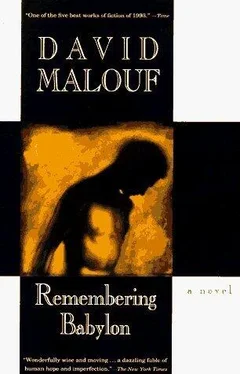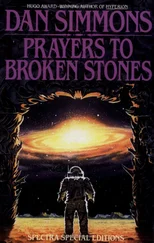The children of this land were made for it, as it was for them, and is to them a rich habitation, teeming with milk and honey — even if much of its richness is still hidden; but then so was the milk and honey of the Promised Land, which was neither milk, in fact, nor honey, and the land itself to all appearance parched and without promise. We must humble ourselves and learn from them. The time will come when we too will be sustained not only by wheat and lamb and bottled cucumbers, but by what the land itself produces, tasting at last the earthy sweetness of it, allowing it to feed our flesh with its minerals and underground secrets so that what spreads in us is an intimate understanding of what it truly is, with all that is unknowable in it made familiar within .
Pausing a moment, he draws back from where his hand, running on ahead, has taken him further than he meant.
He is aware of the lamp’s hissing; of his wife, her head, under its cloud of hair, bent over the music she is reading through; and beyond the sill, the night, stirred by the clapping of wings, the inaudible puff of seeds as they spread, the random but orderly couplings and killings of a nature different from the one he was used to at home, yet the same.
Since earliest childhood, botanising has been his one sure refuge. With the loneliness of an only child among nine brothers and sisters, he had discovered that the world of plants offered an order he would never find among men. Even the idea of family seemed most moving to him as it applied to specimens as wonderfully different to the eye as the apple and the rose.
He was a night wanderer. Slipping out in the dark he would track night-scented flowers in the summer woods, or, with breathing suspended and his whole body alert, observe from a hide, in the soft night air and a liquid light with its own colours, the life of creatures that were abroad, as he was, while the human world slept. That was the joy of the thing. While the eyes of others were closed, or open only on the fanciful world of dreams, to look in on a part of creation that is secret, but only because it lives in another time zone from that of men.
Night-creatures, night-flowering plants. They touched on what was hidden in his own nature; and it occurs to him, as he plunges through the undergrowth with Gemmy, or strides knee-deep up a slope, that in a way he is still at it. This, from the point of view of where he began, is the night side of the globe. He has found it at last, can explore it now in full sunlight. Is that why his discoveries here mean so much to him?
He turns back a moment to his notebook, and what he sees is no longer a wild place but orchards in which, arranging themselves in rows, wild plum and fig and apple have moved into the world of cultivation, and in the early morning light, workers with the sun on their backs hang from ladders and reach out to pluck them.
The theodolite , he writes, offers only one way of moving into the continent and apprehending the scope and contours of it. Did we not, long ago, did not our distant ancestors, bring in out of the great plains where they wandered, out of mere wilderness, the old coarse grasses that lapped the bellies of their horses, and, separating the grains and nursing them to plumpness, learning how to mill and grind and make daily bread, and how to tend the wild vine till its fruit yielded wine, create settled places where men and women sit at tables among neighbours, in a daily sacrament which is the image of the Lord’s greater one? All this can be done again. This is what is intended by our coming here: to make this place too part of the world’s garden, but by changing ourselves rather than it and adding thus to the richness and variety of things. Our poor friend Gemmy is a forerunner. He is no longer a white man, or a European, whatever his birth, but a true child of the place as it will one day be, a crude one certainly, unaware of what he has achieved — and that too perhaps is part of His intention: that the exemplum should be of the simplest and most obvious sort, deeply moving to those who are willing to look, and to see, without prejudice, that in allowing himself to be at home here, he has crossed the boundaries of his given nature. Of course, such changes inspire in the timid a …
He breaks off, his hand pausing above the inkwell. He has come to a knotty place in his reflections, feeling a lapse of the high emotion that has carried him on.
One day, not long ago, returning from one of his afternoon excursions, he came upon Jim Sweetman with his granddaughter on his shoulders, a pudgy child of three, rather spoiled and with eyes so deep in her fat little cheeks that you caught only a glint of them as she jerked her legs and crowed. The old fellow was prancing about in circles, lifting his head and dancing left and right as the child directed.
Still in the excited state his excursions aroused in him, he hailed the man, and they stood a moment on the path while the child, sulking, jerked her legs, impatient to have her grandfather go back to being a pony. Jim Sweetman, patiently, set his hands over her knees, and still half-attending to the child’s call upon him, and a little put out himself, perhaps, at the interruption to their play, listened, accepted the hard little fruit he was offered, though not the suggestion that he should bite into it. So he himself did, and showed the man the seeds.
Jim Sweetman did not light up with the vision of orchards. He seemed embarrassed in fact, and at just that moment the little girl drove her heels into him.
‘Stop that now,’ he said, more sharply perhaps than he meant. ‘Grandpa’s talking.’
The child’s face collapsed. She took a breath, and Jim Sweetman, feeling the change of weight in her little body, lifted her down on to his arm.
Too late. She had begun to shriek, and very satisfied with the effect it produced, she continued, and would not be pacified. He had stood by, waiting for the child’s passion to exhaust itself. He had forgotten what fierce, self-willed little creatures children could be. It was so long since he had had any of his own.
The child shot a glance at him, shrieked again, and Jim Sweetman, stricken, while the child sobbed into his breast, shook his head at him as if he were responsible. If the man recalled anything of the occasion it would be the little girl’s grief. The hard little fruit he had been shown meant nothing to him.
Jim Sweetman, for all his lack of imagination, was the best of them. He knew better than to try the rest. Being caught, once or twice, coming in with Gemmy, he had seen the look in their eyes, and felt Gemmy, who missed very little in this way, fall away from his side — intending, no doubt, kind creature that he was, to protect him.
If he is to get any response to his schemes he must go higher; that’s what he has learned. Farmers grasp only what they already know. So, with no notion as yet who it is intended for, he has begun writing what he thinks of as a ‘report’.
He looks again to where his wife, just feet away, sits with a score in her lap, her head bowed over her music. She turns a page, her hand going to catch a wisp of hair that has come astray.
‘What is it?’ he asks, as if he heard a faint burst of what she is playing in her head. ‘Is it Field?’ But she does not look up. She has not heard him over the wave of notes.
He is in the habit of turning pages for her while she plays — or rather, he was; she has no instrument up here. It is the first time in all their moves that he has been unable to provide one for her. She does not complain; though music, he knows, is her refuge from the frustration she sometimes feels. With him , with his passionate confusions. She saves herself by taking no part in his interests, perhaps out of a fear of finding them foolish, and he in turn keeps out of hers. He does not interfere in the letters she writes to their girls, and to the boy, Edward, except to add his greetings at the bottom of a page. And if he dips at times into the things she likes to read, articles on political economy and the like in the journals she receives, it is not because he hopes to share their arguments with her, but, in a tender way, to catch a glimpse of where she has been, and what it might be there that has excited her. He reads over such passages, and their underlinings, with a deep pleasure, though often enough they have no meaning to him. Only in music, when he turns the pages and sees precisely where her fingers have arrived at in the score, is he quite certain of her emotions and his own, and feels they are one.
Читать дальше












